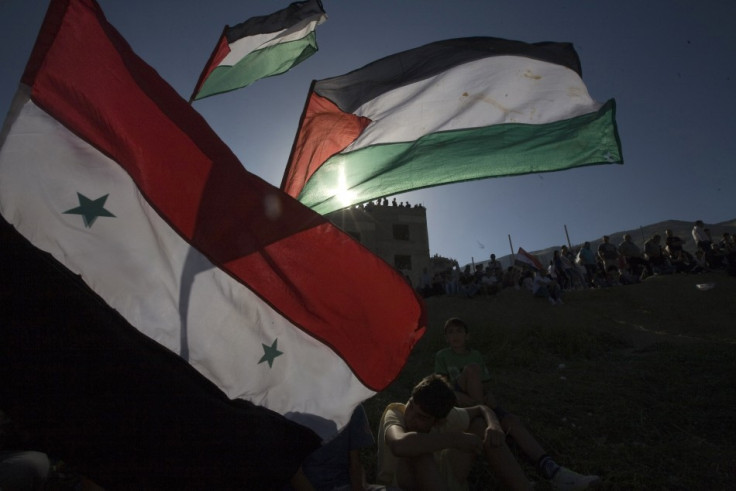Israel: Pro-Syria fighters kill Palestinians

Gunmen from a pro-Syrian Palestinian organization shot at people during a protest at a Palestinian refugee camp near Damascus on Monday, WAFA, the official Palestinian news agency, reported on Tuesday. A reported 14 people died in the attack.
According to WAFA and other reports, the fighters belonged to the Popular Front for the Liberation of Palestine of Palestine General Command (PFLP). The gunmen allegedly clashed with mourners in the Yarmouk refugee camp, in Syria after funerals for Palestinian protesters who were killed on Sunday at the border between Syria and the Israeli-held Golan Heights.
Also, according to Reuters, the shootings took place on Monday after mourners accused the organization of sacrificing Palestinian lives by encouraging protesters to demonstrate at the Golan Heights.
Witnesses explained that following the burial of seven people who were killed in the border protest, by Israeli forces, mourners started to march towards the organisation's headquarters. While the protesters started to throw stones at the building, security guards allegedly came out and starting shooting at crowd.
On Tuesday, commentating on the incident, the Palestinian leadership in the West Bank condemned what it called the "crime" by what it said were "armed groups" of the Popular Front for the Liberation of Palestine-General Command and confirmed that the Popular Front's fighters had fired live ammunition into crowds of young demonstrators at the camp.
This incident will further deepen divisions that are emerging in the camp between those who support President Bashar al-Assad of Syria and those who sympathize with the Syrian opposition as many says the protests were backed by the al-Assad regime.
On Tuesday, Syrian police and security officers visited and searched the headquarters of the Popular Front for the Liberation of Palestine- General command while people hoped an investigation would be launched despite the protests against the regime, on which the security forces focus.
People that said they saw the attack claim the security guards responsible of the shootings were all Palestinians and many believe that the demonstration at the border was organized to serve the interests of President Assad to distract international attention from the on-going uprising in the country. Many also deplore the fact that the protest had nothing to do with seeking justice for Palestinian refugees and displaced Syrian residents of the Golan Heights.
The Popular Front for the Liberation of Palestine-General Command, which is led by Ahmed Jibril, has been bitterly at odds with the mainstream Palestinian organizations for decades .
It was founded by George Habash after the occupation of the West Bank by Israel in 1967, and the Popular Front for the Liberation of Palestine was first formed as a resistance movement.
Combining Arab nationalism with Marxist Leninist ideology, the PFLP sees the destruction of Israel as integral to its struggle to remove Western influence from the Middle East.
However the collapse of the Soviet Union undermined the PFLP and the group lost ground to the Islamic Hamas movement. Attempting to bolster its position after the supposed 1993 PLO-Israeli peace accord the PFLP decided to form a coalition groups with other Palestinian organisations that were also opposed to the deal.
It boycotted Palestinian elections in 1996, but three years later, accepted the formation of the Palestine Authority and sought to join Yasser Arafat's administration.
The succession of Abu Ali Mustafa, who replaced George Habash in 2000, was seen by many in Israel as heralding a return to the group's radical policies of 1960s, 70s and 80s.
But Mustafa was assassinated by Israeli forces in August 2001 and the group struck back, shooting Israeli Tourism Minister Rehavam Zeevi, leader of a right-wing party, and claiming it as revenge for Mustafa's death.
As the organisation has been engulfed in a direct war for revenge after the person accused of being behind the assassination was arrested, people are however increasingly suspicious of the organisation's real motives and the border protests organised last Sunday did nothing to stop popular discontentment. Many said that the organisation's move has also bolstered by the Assad regime, a suggestion put forward by both both Israel and the USd.
A State Department spokesman, Mark Toner, said in Washington, "It's clear that such behaviour will not distract international attention from the Syrian governments' condemnable behaviour on its own citizens."
The Israeli authorities also took Washington's position as they affirmed in a statement that the demand by the Palestinian refugees of 1948 and their descendants for a right of return to their former homes in what is now Israel "remained a sacred goal not to be exploited for any political purposes," adding that the blood of those who were killed on Sunday at the border was not to be "exploited or traded for private interests."
© Copyright IBTimes 2024. All rights reserved.





